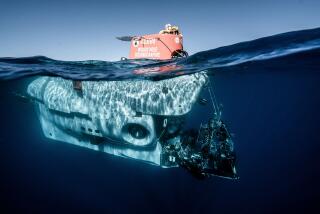Down and Dirty in the Marina : Divers Scrub and Scrape to Keep Yachts Safe From Denizens of the Bay
- Share via
Marko Mavrovich spends most of his working day upside down, immersed in a cloudy green saline solution whose exact composition would fascinate a toxicologist. On his hands and knees he scrubs and scrapes, fighting the resistance of wet suit and water. He breathes slowly--air is money in this business--and works his tongue to expel the steady trickle of brine that sneaks into an inverted scuba mouthpiece. He hopes the propeller looming in the murk doesn’t suddenly spring to life.
Welcome to the dark underbelly of Marina del Rey, a hidden battleground and venue of one of the world’s toughest jobs. The teak-and-brass encrusted yachts and their wealthy owners may gleam gloriously in the summer sun, but below the waterline a voracious community of tiny tubular worms, slimy microbes and corrosive electrons is on the offensive. And the essential task of defending boating civilization from this onslaught falls to the hardy young men of the dive service industry.
“It’s a special breed of person who can do this,” says Paul Skipper, owner of S & K Dive Service and a pioneer of the underwater maintenance business in Marina del Rey. “It’s always hard to tell if a guy’s really got it in his heart to work this hard.”
Jack Robinson, a former stunt man and owner of Galiongee Mariner Service, said his firm once went through more than 70 people in one year. And that’s for a job that can pay $500 to $800 for a 30- to 35-hour week. “We get these ex-Marines and body builders in here saying ‘I can do anything,’ but they calm down after a few days.” Californians usually can’t handle it, says Robinson. Too laid-back. Israeli army veterans are a much better bet.
Mavrovich, who was raised on an island in Yugoslavia and went to merchant marine school, is modest about the physical demands of cleaning boat bottoms. “It keeps you in shape, but it’s not something you can do all your life,” he says with massive understatement. Scott Gee, a former Navy diver, notes with a sardonic grin that “the guys who are used to looking at pretty fish don’t last long.” Salvage work in the Navy, Gee says, was child’s play compared to boat cleaning.
Mostly, divers clean off undersea growth, which is as interesting as scrubbing floors, only harder. In Marina del Rey, the primary culprits are tube worms, tiny organisms that grow in coral-like strands on metal hardware such as propellers and on any thinly painted portion of the hull. Don Speaker, owner of Yacht Services Co. and perhaps the leading local authority on various aquatic adversaries, says they grow 1/16 of an inch per day in the warm summer water. Less nefarious algae cling even to well-painted surfaces.
Divers also replace the chunks of zinc that are attached to the hardware of boats to prevent corrosion. Because propellers, shafts and rudders are made of metal alloys, they corrode by an electrolysis reaction when immersed in salt water. When zinc is attached, it corrodes instead of the alloy. Some divers also wield drills and saws, driven by compressed air, to install knotmeters and exhaust ports and the like.
Independent Contractors
And then there are “recoveries.” July 5, like any other day after a holiday, brings lots of calls from people who managed to let indispensable items slip into the harbor. Keys and glasses are the mainstays of recovery, but the veteran divers have seen it all. Moshe Kotlov of Neptune Divers says he’s recovered a drunk LAPD officer’s gun as well as diamond rings, Rolex watches and credit cards. Skipper once went down after the entire wardrobe of a man who’d had a fight with his girlfriend.
Nearly all divers, including Mavrovich and Gee, are independent contractors who work for underwater service companies on a piece-work basis. Typically, the companies charge 75 cents to $1.10 per foot, depending on the type of boat, for a monthly clean, and the divers collect 40% to 50% of that fee. Divers who have the endurance to clean 10 30-foot boats a day can thus do pretty well--if they avoid ear infections and adapt to the strange psychological pressure that comes from spending every day underwater.
They can make even more, of course, if they keep the whole fee for themselves. And since it takes little more than a regular scuba outfit plus a 40-foot air-hose (tanks are left on the dock or in a dingy) to be your own business, the competition is ferocious. In Marina del Rey, four big service companies have 600 to 1,000 accounts each, but dozens of independent operators also ply the waters, offering lower prices and promising better service.
In a business where hands-on management means donning scuba gear, quality control is a major problem for the all the companies, especially since most customers never really see what they’re being billed for. The temptation is strong, at the end of a tough day, for a diver to wipe off the film along the waterline and call it a clean. Skipper, Robinson and other owners--who all once did the cleaning themselves--still go under unannounced to check their contractors’ work. As in any service business, customer satisfaction is everything, and boat owners are a fussy lot.
One would expect divers to get some respect, since the they’re the first line of defense against possible threats to a very valuable investment. Nope. “Most of the owners see you as the equivalent of a gas station attendant, there to serve,” says Kotlov. “But a few, especially the racers, are very knowledgeable.”
“Race cleans” are in fact the divers dream, as they involve little more than dusting off the hull of a well-maintained boat. No rock-like tube worms. No menacing engines. On a recent stellar morning in Marina del Rey, as the divers from S & K puttered off in their skiffs across the glistening water, it was almost possible to think of diving as a fun job. Almost.
More to Read
Sign up for The Wild
We’ll help you find the best places to hike, bike and run, as well as the perfect silent spots for meditation and yoga.
You may occasionally receive promotional content from the Los Angeles Times.






